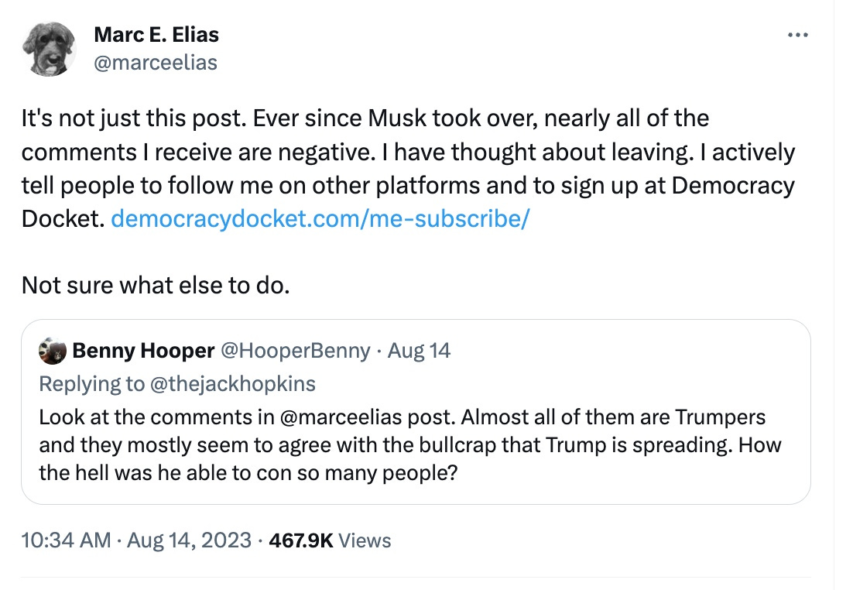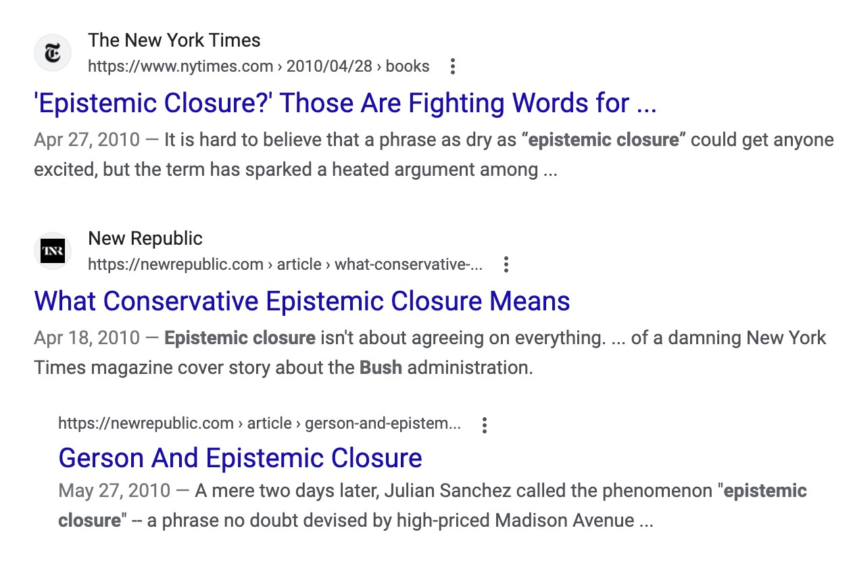Dostoevsky obligingly gives us a character who’s clearly possessed in exactly this sense — a dissolute nobleman around whom the various radical conspiracies swirl. He is, simultaneously, a subversion of the brooding Byronic hero archetype that was so popular in 19th century European literature, and an eerie anticipation of the modern concept of the serial killer. How did he get this way? Remember the modern view of our desires is that they come from within us, and indulging them leads to inner harmony. But the older and truer view is that they can come from outside, force their way into our skulls through an opening, set their hooks in our brains, lay their eggs. These fledgling desires start out small and weak, but to indulge them is to feed them, grow them, until they take over their host and move its mouth and limbs around like a puppet. In this sense the porn addict, the drug addict, and the rage addict are all alike: sensual dissipation gets boring eventually, and you need harder and harder stuff to feel the same thrill, until one day you reach for something so hard you lose yourself forever.
The Dostoevskian twist to all this is that the proto-serial killer is far more sympathetic, and ultimately more redeemable, than the revolutionaries. The radicals’ motivations spring from the same emotional source as his, theirs are just sublimated into politics, which is why the form of the dystopia doesn’t really matter to them, all that matters is that there be a boot stomping on a human face. The sexual sadism of the serial killer is unflinchingly portrayed as less disordered and less socially destructive than its political equivalent and, ultimately, as rather basic. It’s actually quite easy to miss all of this because it’s so deeply at odds with modern sensibilities. Not just “serial killers are better than communists actually,” but also “serial killers are really pretty boring actually,” and all from the guy who just invented serial killers.1
But what if the radicals aren’t sublimating anything at all? What if there’s another kind of demon, another kind of infohazard, another kind of meme, which rather than infecting or possessing individuals, instead tries to do that to entire societies? Such a being might still work through individuals, the way a Haitian voodoo spirit speaks through a chwal, but here the individual puppet is not a target, but rather an instrument or a transmission vector. The internet jargon for such a being is an “egregore,” and you’ve encountered them before: the bizarre fad that sweeps through a middle school class like a wildfire, the war fever that grips a nation and turns it overnight into a basket of bloodthirsty lunatics. Dance crazes, viral TikTok challenges, internet-mediated mental illnesses. There’s a classic Futurama gag involving the Brain Slug Party, but the real joke is that every party is the Brain Slug Party, they’re all egregores. Have you ever spoken with somebody who had hashtags in their Twitter bio? If you looked carefully, you may have seen the slender, silvery proboscis emerging from the back of their neck and vanishing into the ether. If you listened carefully, you may have heard the alien metallic clacking of the egregore’s mandibles, as it sent messages down that tube for the meat puppet to vocalize.

Sometime in the mid-19th century, an egregore was born in the Russian Empire. It went by a thousand different names — among them: anarchism, communism, nihilism, democracy. What’s that? Those four ideologies are completely opposed to one another? That’s the entire point! It wasn’t actually any of those things, it was an egregore, its true name was something like Melkhorbalai or Uztaa-Binoreth. It wore those other names like skins when it was convenient to do so, which is why in the real life history of 19th century Russia we see countless examples of individuals switching between communism, anarchism, and democracy like they were flavors of ice cream.
The egregore wanted none of these things: it wanted to grow, to spread, to manifest itself into this reality. Madly, it willed destruction, and the more destruction it caused the stronger it got, and the easier further destruction became, a runaway exothermic reaction endlessly feeding on itself. So the reformist zeal of the 1840s became Nechayev’s insane nihilism of the 1870s, then the even more insane terrorism of 1900-1917 with which I opened this review, until finally, strengthened by half a century of blood sacrifice, that rough beast slouched towards St. Petersburg to be born. The trauma of that birth ripped apart first Russia, then Europe, then it almost ate the rest of the world too.
Could anything have stopped it sooner? In Dostoevsky’s story there’s one character who tries lamely to stand in the way of the swirling, coalescing, immaterial malevolence. He is a reactionary, a newly-freed former serf,3 and (like Dostoevsky himself) a repentant former revolutionary. He’s young and hip, but has old and edgy views, a perfect stand-in for online “trads”. Given Dostoevsky’s own views it would be easy to make him the hero of the story, but Dostoevsky is too great a writer for that, and instead makes him a pathetic LARPer:
“I only wanted to know, do you believe in God, yourself?”
“I believe in Russia … I believe in her orthodoxy … I believe in the body of Christ … I believe that the new advent will take place in Russia … I believe …” Shatov muttered frantically.
“And in God? In God?”
“I … I will believe in God.”
How great a description is that of all the crusader-avatar twitter accounts named “DeusVult1571”? Imagine one of them blubbering: “I believe in based aesthetics … I believe in Western civilization … I believe in the Hajnal line … I believe …” Ah, but do you believe in God? Probably some of them do, but for many others it’s a pose, or a meme, or a philosophical premise that they must accept in order to turn the rest of the brand they’ve assumed into a self-consistent whole.2 For these, the god they worship is just another egregore — one small and weak for now, less threatening perhaps than some others, but feed it, let it grow, and see how fast it turns on you.
The other force that could have resisted the growing darkness is the parents’ generation, the liberals of 1848, Turgenev’s boomers. We already know how that turned out in real life, but while Dostoevsky didn’t live to see it happen, he had these peoples’ number. Once so bold in condemning their government and sneering at their civilization, they are suddenly timid in the face of their children, terrified of being seen as uncool or conservative or just not with it. That’s a good way to raise a psycho, and Dostoevsky more than hints that everything which follows is ultimately their fault. And it’s a bad way to face down an egregore. Doing that requires boldness and … well:
“But this is premature among us, premature,” he pronounced almost imploringly, pointing to the manifestoes.
“No, it’s not premature; you see you’re afraid, so it’s not premature.”
“But here, for instance, is an incitement to destroy churches.”
“And why not? You’re a sensible man, and of course you don’t believe in it yourself, but you know perfectly well that you need religion to brutalise the people. Truth is honester than falsehood …”
“I agree, I agree, I quite agree with you, but it is premature, premature in this country…” said Von Lembke, frowning.
“And how can you be an official of the government after that, when you agree to demolishing churches, and marching on Petersburg armed with staves, and make it all simply a question of date?”
“Premature, premature”, is what the useless normies will bleat when our own radicals are blowing up Mt. Rushmore and pulling down statues of George Washington. Who are these radicals? I have no idea what the egregore will call itself this time. It doesn’t matter. Its true name sounds to human ears like a high-pitched mechanical screeching and clicking, a sound calculated to drive men mad, and to drive madmen into making it real.
1. I’m told that the internet jargon for this is an “unbuilt trope.”
2. Dostoevsky positions a former serf as the defender of “Holy Russia,” Orwell suggests that if there is hope it lies in the proles, Bismarck believed the poor would serve as a reactionary bulwark against liberalism, and MAGA believes that various dispossessed and subaltern groups will keep America great. Are they all correct? No. They’re all wrong. The lower classes have no special compass for political or religious truth, they’re just almost definitionally slightly behind the times. When an egregore is rapidly accumulating strength, they’re likely to oppose it out of inertia, but they’re as vulnerable as anyone to its blandishments, and will just as vigorously defend the new thing once it has taken over.
3. Look, I have a lot of sympathy for these guys. Like the Russian radicals of the 1870s, they correctly observe that there’s something insane and rotten about our society, but unlike those radicals they’re attracted to something that’s really out there and really true and good. “Fake it til you make it” is not the worst strategy ever invented for securing a mature and authentic faith in a supreme being. But once you’re in that state, there’s a clock running, your time is limited, there are other things out there in the night, attracted by the smell of lost and receptive souls.


















